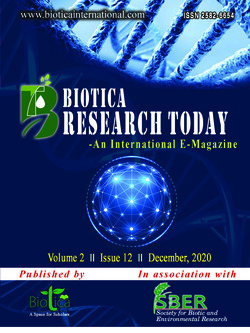
Integrating Information and Communication Technology (ICTs) in Education: A Comprehensive Study of Tripura
Subrata Majumder
Dept. of Information & Technology, MBB University, Agartala, Tripura (799 204), India
Rajib Das*
Krishi Vigyan Kendra - Khowai, Divyodaya, Chebri, Khowai, Tripura (799 207), India
DOI: NIL
Keywords: Education, Effectiveness, ICTs, Tripura
Abstract
The rapid evolution of Information and Communication Technologies (ICTs) has significantly transformed various sectors, with education being no exception. This research paper aims to investigate the uses of ICTs in education in the northeastern state of Tripura, India. The study focused to identify the implementation of ICT, tools their impact on teaching, learning and the challenges faced in integrating these technologies into the educational system. It was found in the study that in a sample population of 101, gender distribution reveals 81.19% females and 18.81% males. Social category analysis highlights SC as the highest at 38.61%. College type preferences show 63.37% in government colleges and urban areas are predominant (78.22%). Learning style preferences lean towards modern methods (58.42%). Most respondents hold college-going qualifications (62.38%). ICT handling ability is perceived as medium by 66.34%.
Downloads
not found
Reference
Ertmer, P.A., 2005. Teacher pedagogical beliefs: The final frontier in our quest for technology integration? Educational Technology Research and Development 53(4), 25-39. DOI: https://doi.org/10.1007/BF02504683.
Gulbahar, Y., Guven, I., 2008. A survey on ICT usage and the perceptions of social studies teachers in Turkey. Educational Technology & Society 11(3), 37-51. URL:https://www.jstor.org/stable/jeductechsoci.11.3.37.
Hussain, A.J., Morgan, S., Al-Jumeily, D., 2011. How does ICT affect teachings and learning within school education. In: 2011 Developments in E-systems Engineering
(DeSE). IEEE, Dubai, United Arab Emirates. December 6-8, 2011. pp. 250-254. DOI:https://doi.org/10.1109/DeSE.2011.50.
Mishra, P., Koehler, M.J., 2006. Technological pedagogical content knowledge: A Framework for teacher knowledge. Teachers College Record 108(6), 1017-1054. DOI:https://doi.org/10.1111/j.1467-9620.2006.00684.x.
Yang, K.T., Wang, T.H., 2012. Interactive white board: Effective interactive teaching strategy designs for biology teaching. In: E-Learning - Engineering, On-Job Training
and Interactive Teaching. (Eds.) Silva, A., Pontes, E., Guelfi, A. and Kofuji, S.T. IntechOpen. pp. 139-154. DOI: https://doi.org/10.5772/31252.
Yunus, M.M., 2007. Malaysian ESL teachers’ use of ICT in their classrooms: Expectations and realities. RECALL: The Journal of EUROCALL 19(1), 79-95. DOI:https://doi.org/10.1017/S0958344007000614.
Virkus, S., 2008. Use of Web 2.0 technologies in LIS education: Experiences at Tallin University, Estonia. Program: Electronic Library and Information Systems 42(3), 262-274. DOI:https://doi.org/10.1108/00330330810892677.
